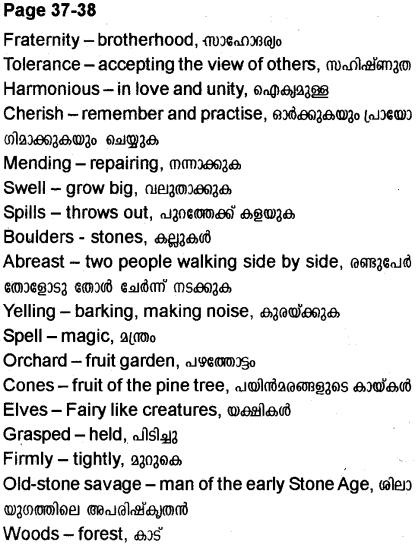Kerala Plus Two English Textbook Mending Wall Questions and Answers Unit 2 Chapter 1 (Poem)
Think And Write
Question 1.
Why does the poet say that there is something that doesn’t love, a wall?
Answer:
The poet says that there is something that does not love the wall because nobody sees or hears anybody breaking the wall. But every spring season, the poet finds the wall is broken. So it is obvious that there is something that does not love a wall and wants to see it broken. It is this ‘something’ that makes the ground under the wall swell causing the stones of the wall to fall down on to either side.
Question 2.
Why does the poet meet his neighbour beyond the hill at spring?
Answer:
The poet meets his neighbour beyond the hill at spring so that they can fix one day and walk along the wall to mend it by picking up the fallen stones and fixing them back.
Question 3.
How does the poet and his neighbour mend the gaps in the wall?
Answer:
The poet and his neighbour mend the gaps in the wall by walking along the wall on either side and picking up the fallen stones and placing them back on the wall in an effort to mend it.
Question 4.
Why does the poet argue that there is no need of a wall in between his estate and that of his neighbour?
Answer:
The poet argues that there is no need of a wall in between his estate and that of his neighbour because his area is covered with pine trees and the poet’s area is full of apple trees. The poet’s apple trees will never go to his area to eat the cones of his pines.
Question 5.
How does the neighbour justify the need for waits or fences?
Answer:
The neighbour justifies the need forwalls offences by saying that good fences make good neighbours.
Question 6.
Why does the poet consider the spring season mischievous?
Answer:
The poet considers the spring season mischievous because it is in that season gaps are found in the walls. He thinks that Spring Season makes the frozen ground under the wall expand. Because of this expansion, the wall gets cracks, making the upper stones of the wall fall down on to the sides.
Question 7.
What are the contrasting views presented in the poem?
Answer:
The poet has one view but his neighbour has a different view. The poet thinks there is no need for a fence orwall between neighbours, especially when the author’s area has apple trees and the neighbour’s area has pine trees. There is no way that the apple trees will trespass into the neighbours estate and eat the cones of the pines. But the neighbour thinks that good fences make good neighbours.
Activity I: Paragraph Writing:
Question 1.
Elaborate the idea in the following line in a paragraph:
“Good fences make good neighbours.”
Answer:
Good fences make good neighbours means it is good to have some limits between neighbours so that their relations will remain healthy at all times. If there is unlimited freedom between neighbours, trouble will soon start. Suppose you grow goats in your house. Your neighbour has a vegetable garden. If there is no fence your goats will go and eat up the vegetables of your neighbour. Will he like it?
Suppose your neighbour’s children come and open your fridge and eat up all the good food you have kept there. Will you like it? So there must be some boundaries between-neighbours and only then there will be good relations.
Activity II (Appreciation)
Question 2.
Discuss the following:
Answer:
→ The central idea of the poem:
The central idea of the poem is that nature does not
like separation and that is why it tends to destroy the walls. But for healthy relations walls or fences are necessary. If there are no boundaries between neighbours, their relation will not last long. Good fences make good neighbours.
→ Symbolic significance of wall in the poem:
The ‘wall’ symbolizes the restrictions between neighbours. Even if you love your neighbour dearly, you can’t give him unlimited freedom in your house. Wall symbolizes such boundaries.
→ Poetic devices employed by the poet:
The poet has employed many devices to make his poem effective. The poem has fine rhythm. He has used a fine metaphor in calling the boulders as loaves and balls. He has used a lot of humour: the hunters finding rabbits for their dogs, his command to the stones to stay in place till his back is turned, and calling his neighbour as a stone age man with stones as weapons in his hands.
His logic of his apple trees not going to eat the pine cones in his neighbour’s estate is very funny. He has used a simile when he says that the two neighbours keeping the stones back was like an outdoor game. There is personification when he tells the boulders ‘Stay where you are.’ Here he thinks the boulders to be some kind of mischievous children who would run away the moment their parents’ eyes are off. There is parallelism in the use of ‘Good fences make good neighbours’.
There is excellent imagery in the poem. We see how Spring Season causes the ground to swell and loosen the boulders. We can see the hunters trespassing with their barking dogs. They are trying to shoot rabbits. We can see the apple trees and the fine trees. We can see the neighbours walking on either side of the wall, fixing the fallen stones and the stones falling down as soon as they turn their backs.
→ Language:
Robert Frost has used very simple but vivid language to write his poem. There are not many words which are unknown to us. The sentences are simple and there are no complexities in the construction. Anybody who knows some English can get the meaning clearly. Essentially Frost is a Romantic poet who loved simplicity in language. Although it is a fine poem, it is very close to the structure of prose and so understanding it is very easy. Only a great poet can do such a thing – make a fine poem using simple words.
→ Structure:
The poem has a simple structure. The poem proceeds with the ease of a story told by a master. There are no twists and turns and everything is clear without any mystification or complication. Frost’s structure is always easy pleasing to the eye and pleasing to the mind.
Question 3.
Now, prepare a note of appreciation of the poem ‘Mending Wall’:
Answer:
Frost once said, “A poem begins in delight and ends in wisdom.” The poem ‘Mending Wall’ proves his theory. He starts his poem in a delightful way saying that there is something that does not like a wall. He does not say what that ‘something’ is. That ‘something’ makes the ground under the wall swell which results in cracks in the wall. Gradually the stones that make the wall fall to either side.
The fallen stones have lost their shapes. Some look like loaves of bread and others look like balls. It will need some spell or magic to keep the stones balanced on the wall even for a short time. The poet has to command the stones to stay in place at least till he and his neighbour have turned their backs on them. He knows very well that they won’t stay there for long.
The gaps in the walls are so big that even two people can pass through them walking side by side. It is funny that nobody ever sees and hears anybody breaking the wall. But every spring time the walls are broken and the people have to repair them. Frost feels there is no need for a wall between him and his neighbour. His neighbour grows pine and he grows apple trees. Will apple tress go and eat the cones of the pine? Why should there be a wall?
A wall was fine if they had cows. Cows could get mixed up. Frost tells his neighbour there is no need fora wall. But the neighbour insists that good fences make good neighbours.
Frost has used many poetic devises to make is poem a fine one. He has used metaphor, simile, personification
II. Read And Reflect
Question 1.
The presence of a wall between orchards ensures good relationship between neighbours. Is K the act of building the wall or acknowledging the neighbour’s request that really establishes the relationship? Do we really need walls? Shouldn’t we dare to go beyond the boundaries?
Mending Wall (Poem) Edumate Questions and Answers
Question 1.
‘Something there is that doesn’t love a wall, That sends a frozen-ground-swell under it And spills the upper boulders in the sun, And makes gaps even two can pass abreast.’
Keeping in view the socio-cultural scenario of our nation write a paragraph elaborating the idea conveyed by Robert Frost in ‘Mending Wall’.
Answer:
ln “Mending Walls”, Robert Frost says that there is something that does not like walls. It makes the frozen ground under the wall expand. Because of this expansion, the wall gets cracks, making the upper stones of the wall fall down to the sides, thus making gaps. Sometimes the gaps are big enough to let even two people pass, walking side by side.
This means there should be no walls between people. But here in India people divide themselves by buildings walls. These walls come in the form of gender, religion, various ‘isms’, castes, position and wealth. These walls are artificially made by us and they should be cracked or even destroyed. As the citizens of the same nation and as children of the same God, we must not build walls and separate people into different compartments. We should be one happy family.
Question 2.
“What I was walling in orwalling out” is a line from ‘Mending Wall’ by Robert Frost. Bring out the contrasting pictures presented in this line. How do these expressions match with the central theme of ‘Mending Wall’?
Answer:
This is a really beautiful line by Frost. When somebody makes a wall, he wants to keep some things inside the wall and he wants to keep some things outside the wall. The things he likes he keeps. inside and the things he does not like he wants to keep outside. Frost starts the poem by saying there is a natural tendency to break walls.
That is why walls break by themselves. But towards the end of the poem, Robert Frost seems to think that walls are a necessary evil. We may not like walls but they are necessary for keeping peace between neighbours. Imagine our neighbour’s goats coming and eating the beautiful plants in our garden. We will definitely riot fike it. Similarly if our dog catches the chicken of the neighbour will he like it? So walls are needed. That is why Frost says “Good fences make good neighbours”.
Question 3.
‘My apple trees will never get across And eat the cones under his pines’ In the light of your reading of the poem ‘Mending Wall’, prepare a write- up expressing your views on the above quoted lines.
Answer:
In “Mending Wall”, Robert Frost has beautifully presented two seemingly different ideas. First he says that there is something that does not like walls. It makes the frozen ground under the wall expand. Because of this expansion, the wall gets cracks, making the upper stones of the wall fall down to the sides, thus making gaps. Sometimes the gaps are big enough to let even two people pass, walking side by side. This means there should be no walls between people. But people divide themselves by buildings walls. These walls come in the form of gender, religion, isms, races, position and wealth. These walls are artificially made by people and they should be demolished.
Frost further says that “Good fences make good neighbours”. We may not like walls but they are necessary for keeping peace between neighbours. Imagine our neighbour’s goats coming and eating the beautiful plants in our garden. We will definitely not like it. Similarly if our dog catches the chicken of the neighbour will he like it? So walls are needed. But such walls are not always necessary as in the case of Frost and his neighbour. Frost cultivates apple. His neighbour cultivates pine. There is no possibility of his apple trees getting across and eating his neighbour’s pine cones. Nor do the neighbour’s pines get across to eat the apples of Frost. In such cases, Frost feels, walls are quite unnecessary.
Question 4.
Read the following lines from the poem and answer the questions given below.
The work of hunters is another thing:
I have come after them and made repair Where they would have left not one stone on a stone, But they would have the rabbit out of hiding, To please the yelping dogs.
a) How do the hunters damage the walls?
b) Why do they drive the rabbits out?
c) What does the poet do after the hunters leave?
Answer:
a) The hunters sometimes damage the wall in their effort to drive the hiding rabbits out.
b) They drive the rabbits out to please the yelping dogs.
c) The poet repairs the gaps after they leave.
Question 5.
Read the following lines from the poem ‘Mending Wall by Robert Frost and bring out the difference in attitude between the poet and his neighbour.
‘He is all pine and I am apple orchard.
My apple trees will never get across And eat the cones under his pines, I tell him.’
He only says, “Good fences make good neighbours”
Answer:
The poet is not at all in favour of having a wall between him and his neighbour. He tries to convince his neighbour by quite logical arguments. He tells him that he is growing apple. His neighbour is growing pines. There is no possibility that his apple trees will go and eat the pine cones of his neighbour. Neither will the pines of the neighbour will come to eat the apples of the poet. So what is the need for a wall, the poet asks. But the neighbour insists on having a wall and he says. “Good fences make good neighbours”. The poet is quite liberal and he wants to be open. But the neighbour is very possessive and he wants to keep his things in his wall. He wants to keep his things in and he wants to keep out the things of others. I think the attitude of the poet is better especially in this context as there is no danger of apple trees attacking pine trees or vice versa.
Question 6.
Bring out symbolic significance of the ‘wall in the poem ‘Mending Wall.
Answer:
Wall in the poem “Mending the Wall” symbolizes the restrictions between neighbours. Even if you love your neighbour dearly, it is necessary to keep some limits. Otherwise your love will turn into hate.
It is true that there is something in nature that dislikes walls. It makes the frozen ground under the wall expand. Because of this expansion, the wall gets cracks, making the upper stones of the wall fall down to the sides, thus making gaps. This process goes on and the entire wall may crumble if it is not mended in time. By making a wall people want to keep some things in and some things out. The question is “Is it good to have a wall between neighbours?”
The answer seems to be yes. We may not like walls but they are necessary for keeping peace between neighbours. Imagine our neighbour’s goats coming and eating the beautiful plants in our garden. We will definitely not like it. Similarly if our dog catches the chicken of the neighbour will he like it? So walls are needed. Thus wall is symbolic of the restrictions or limitations between neighbours. These limitations are necessary to have permanent and healthy relations.
Mending Wall (Poem) About The Author

– Robert Frost
Robert Frost (1874-1963) is an American poet. He is well-known for his poems which are in a colloquial style. His poems begin in delight and end in wisdom. He has received the Pulitzer Prize a number of times. “Stopping by the Woods on a Snowing Evening” and ‘Road Not Taken” are two of his most famous poems. Our Jawaharlal Nehru had these lines inscribed and kept on his table: “The woods are lovely dark and deep, And I have promises to keep, And miles to go before I sleep, And miles to go before I sleep.” These lines are from ‘Stopping the Woods….” by Robert Frost.
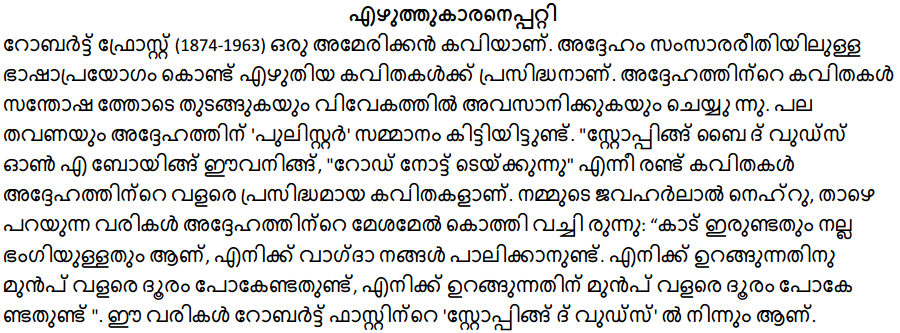
Mending Wall (Poem) Summary in English
Lines 1 … 11 (Something we find them there.)
There is something that does not like walls. It makes the frozen ground under the wall expand. Because of this expansion, the wall gets cracks, making the upper stones of the wall fall down on to the sides. Gaps are made as the stones fall off the wall. Sometimes gaps are big enough to let even two people pass, walking side by side. Hunters also encroach through the gaps. I come after them and repair the broken walls. Sometimes the wall is so damaged that even two stones, one on top of the other, are not found. Somehow the hunters would bring into the open the hiding rabbits to make the barking dogs happy. (There is some fun in the statement here. It is actually the dogs that bark and scare the rabbits out of their hiding places. But the poet says the hunters bring out the rabbits by destroying the wall to please their hunting dogs.) No one ever sees or hears anybody making gaps in the wall by making the stones fall down. But in the Spring Season, which is the repair time for walls, the gaps would be found. Nobody knows how these gaps come or who makes them.
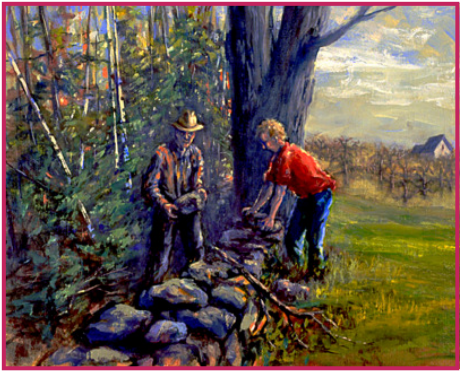
Lines 12-20 (I let my neighbour…. with handling them.)
I inform my neighbour, who lives on the side of the hill, about the gaps in the wall. We decide to meet one day and walk along the wall so that once again we can set it up. Then stones have fallen to both sides of the wall. He would pick up the stones fallen on his side and I would pick up that ori my side and set them up again on the wall. The fallen stones have lost their original shape. Some of them look like loaves of bread whereas others look like balls. To balance them on the wall, we need some kind of magic. We command them: “Stay there till we turn our back on you!” (There is also some fun here. They know the stones will not stay on the wall for long. They simply want them to stay there at least till their backs are turned on them.)
Lines 21 -34: (Oh, just to give offence.)
By lifting the stones and placing them on the wall our fingers become rough and painful. Consider it an outdoor game between us, one player standing on one side of the wall and the other standing on the other side. It means nothing more than that. There are also places where we do not actually need a wall. His area is covered with pine trees and my area is full of apple trees. My apple trees will never go to his area to eat the cones of his pines. I tell him that. But then he tells me that it is good fences that make god neighbours. Mischief grows in me and I want to put some better idea into his mind. So I ask him how good fences can make good neighbours. Good fences are okay if we were growing cows to prevent them from getting mixed up. But here we do not rear cows. So what is the need for a fence? Before I built a wall I would try to find out what I was keeping in and what I was keeping out and whom I would offend by making the wall.
Lines 35-45 (Something there is ….make good neighbours.)
It seems there is something that does not like a wall. It wants the wall pulled down. I would say it was elves that wanted the wall to be broken. But I know it is not elves that did it. I wanted him to tell me what it is that did not like the wall. As I contemplate like this I can see him carrying two stones holding them firmly in each hand. To me he looked like an uncivilized man from the Old Stone Age Era, whose weapon was stone. He is moving in the darkness of trees and their shade. He is not yet ready to give up his father’s saying although he has thought about it so well. Once again he repeats that good fences make good neighbours. (Reft also there is great fun. Frost pictures the neighbour with the stones as a Stone Age man using stones as his weapon. He is not ready to become civilized as he still wants to live in the darkness of the Stone Age.)
Mending Wall (Poem) Summary in Malayalam
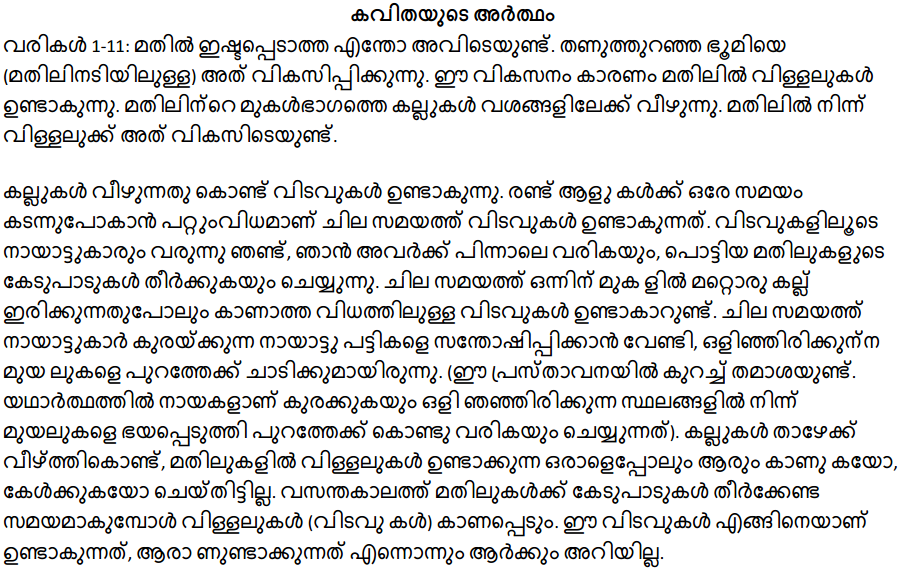
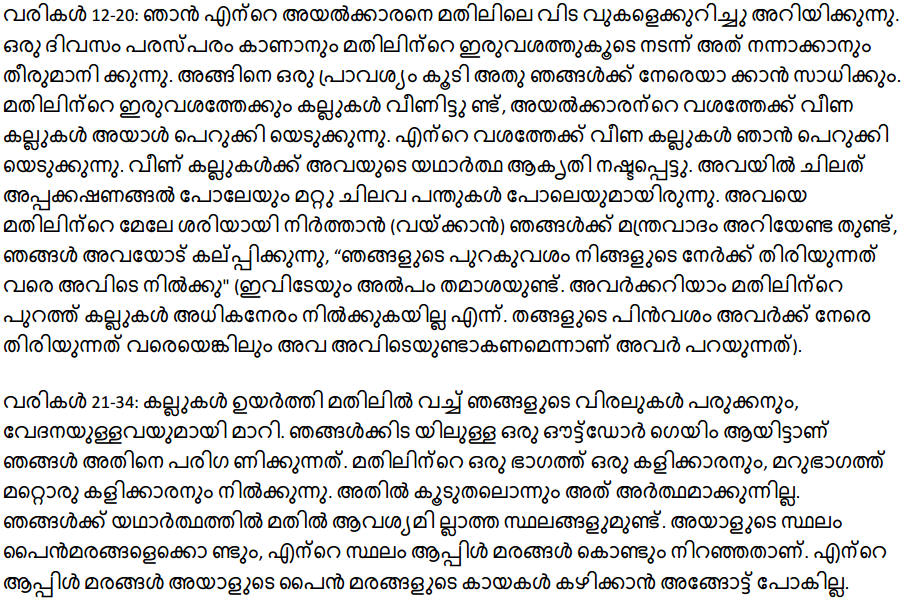
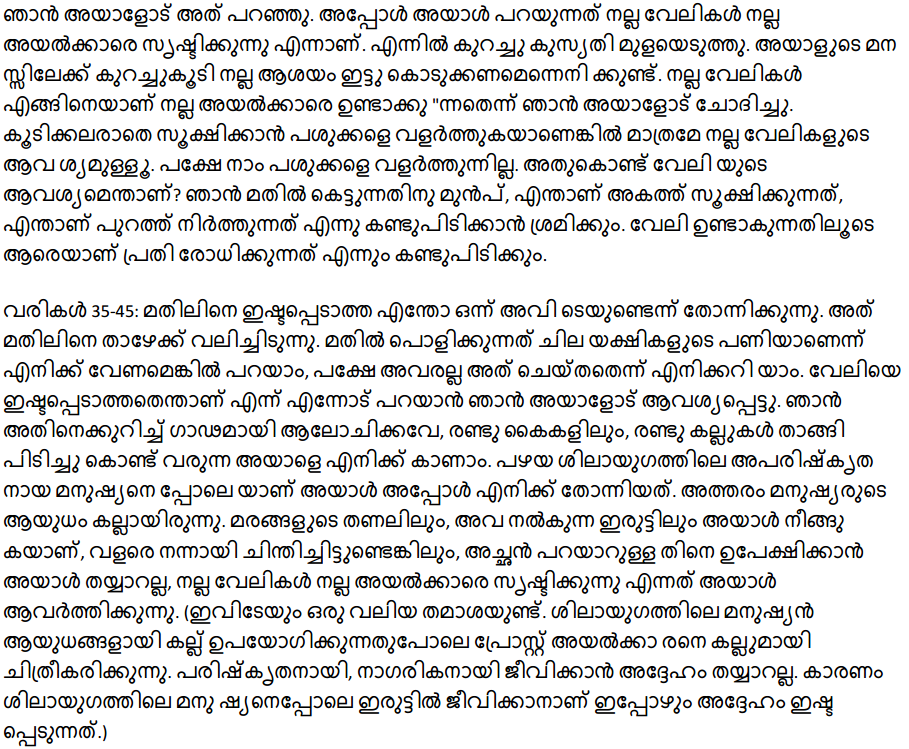
Mending Wall (Poem) Glossary
